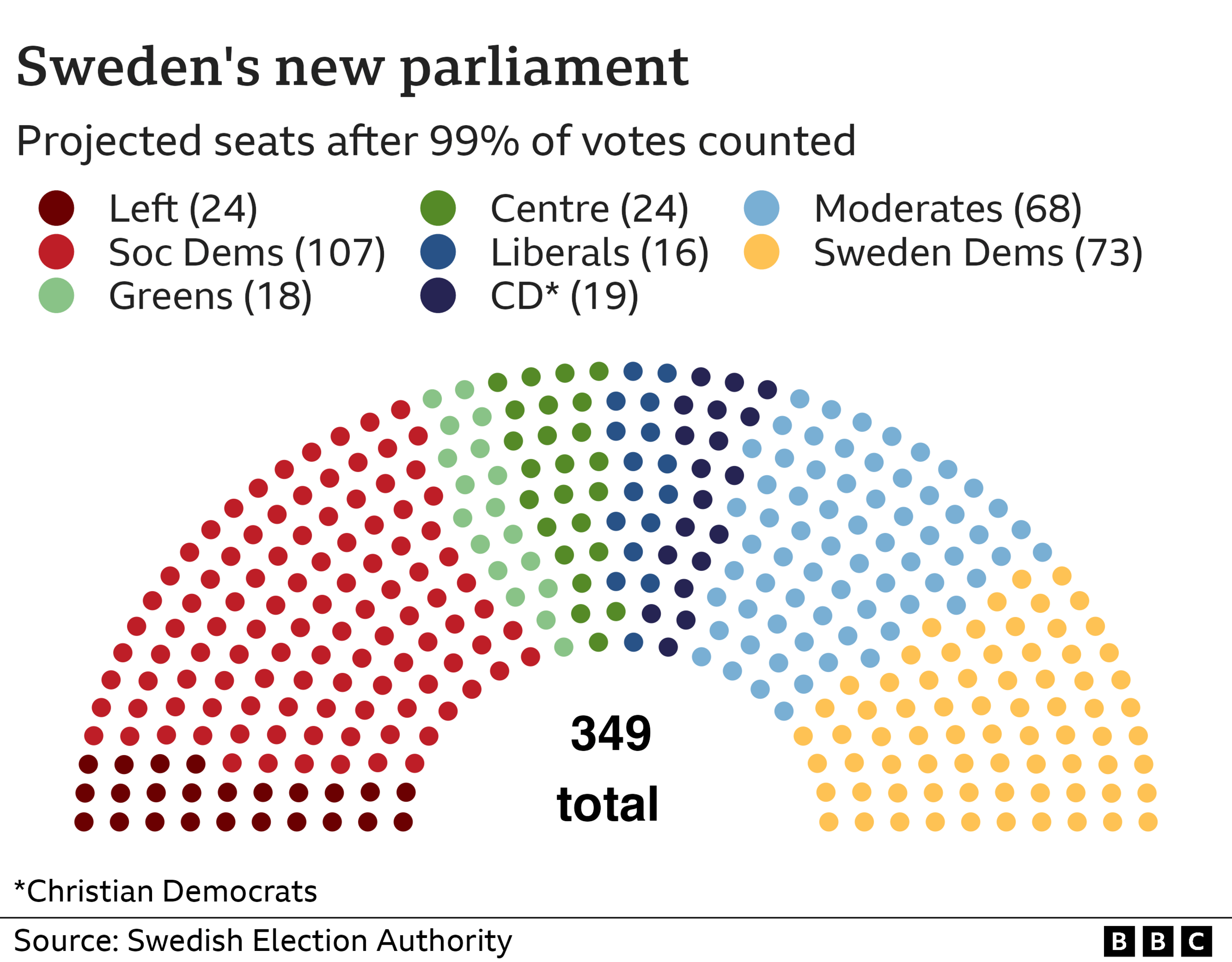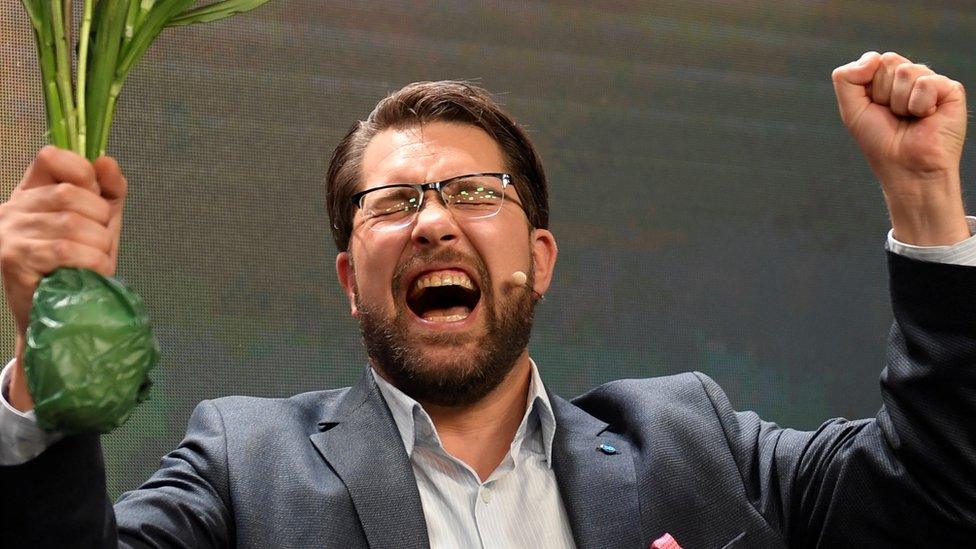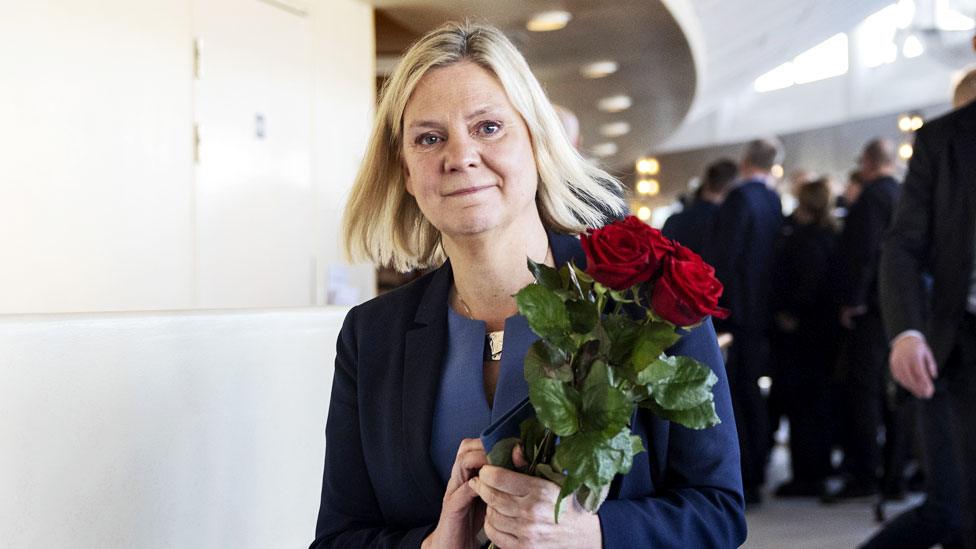Sweden election: How an ex neo-Nazi movement became kingmakers
- Published

Sweden Democrats leader Jimmie Akesson delivers a speech to supporters following Sunday's vote
More than one in five Swedes voted for the radical anti-immigration Sweden Democrats (SD) party in elections on Sunday.
Now the second-largest political party in the country, its anticipated 73 MPs are expected to play a crucial role in supporting a ruling right-wing coalition - if not a formal position in the government itself.
It would be the first time the nationalist party has come anywhere close to the levers of power in Stockholm.
A focus during the election campaign on issues around immigration and violent crime have put the SD's agenda at the heart of mainstream Swedish politics like never before.
It is a watershed moment for a party founded by Nazi sympathisers, shunned for decades by the mainstream - and now on the cusp of playing a kingmaking role in a country better known for its stable and predictable politics.
According to the latest election figures, the SD won 20.6% of votes cast on Sunday - making it the largest in a bloc of right-wing parties now with a collective majority in parliament.
"This is dramatic given that they only entered parliament in 2010," University of Gothenburg political scientist Johan Martinsson told the BBC.
"Sweden used to have an extremely stable and predictable political party system. Three elections later - and they are the second largest party," he says.
Martinsson describes the party as "primarily an anti-immigration, anti-multicultural, nationalist party" - but stops short of labelling them far-right.

Supporters of the Sweden Democrats celebrate the results of an exit poll following Sunday's vote
Founded in 1988, the SD struggled for two decades to win enough votes to elect any MPs at all. But ever since entering parliament in 2010, the party has increased its share of three successive elections.
As of Sunday it had displaced the Moderates as the country's most popular right-of-centre party.
Martinsson says the results are a "dividing line" in Swedish history.
Its success has led to a fierce debate over how much the party has changed ideologically during its transformation from political pariah to power-broker.
Current leader Jimmie Akesson, who took over in 2005, unveiled a "zero-tolerance" policy against racism and extremism ten years ago - and in 2015 he even suspended the party's entire youth wing over its links to the far-right.
The party has also undergone an extensive rebranding: replacing its burning flame logo with a more innocent-looking flower and scrapping its "Keep Sweden Swedish" slogan.
But those changes have not been enough to end the accusations that the party poses a threat to Sweden's minority groups.
They include Willie Silberstein, the chair of Sweden's Committee Against Anti-Semitism - who has himself become a target of anti-Semitic abuse in recent days after using his position to publicly criticise the SD in a television interview.
"The Committee has a problem with parties that were founded by Nazis. That is not an opinion - that is a piece of fact," he told the BBC. "If one party is so full of people that need to be excluded because they are Nazis - it says something about that party."
He points to a widely-reported study published last month by Swedish research group Acta Publica that claimed to have identified 289 politicians from the largest parties who had expressed views that could be deemed racist or even Nazi. , external
The vast majority of them - 214 - were members of SD.
"It scares me that they might have a big influence in Swedish politics," he says. "I think of not only the Jewish minority, but of immigrants in general."
Tweets and social media posts from party members - and sometimes even elected officials - continue to get the party in trouble.
In the height of the election campaign SD's legal spokesperson, the 26-year-old MP Tobias Andersson, tweeted a picture of a Stockholm underground train branded with the party's colours.
"Welcome to the repatriation express. Here's a one-way ticket. Next Stop Kabul," he wrote.
Some Swedish commentators criticised the post but party leader Akesson refused to apologise, arguing that it was intended to mock those who were offended by the party's posters according to news agency AP.
The party denies the accusations of racism.
"All that was before I was born," says Emil Eneblad, vice chair of the SD's youth movement Young Swedes.
"People accused us of bad stuff in the election, I don't think the fact that there were shady people in the party 30 years ago has affected our election standing," the 21-year-old campaigner told the BBC.
He claims the party had almost doubled its support among young people in Sunday's election - something he credits with focusing on three issues in particular: safety, employment, and immigration.
"Young people are looking for something else," he says.
Political scientist Johan Martinsson says that issues around immigration have been simmering for a long time, pointing out that Sweden has received among the highest number of asylum seekers per capita in the world over the last few years.
This, and a perceived increase in violent crime may explain the surge in support for the SD, a party which has not only campaigned on both issues for years, but has risen to prominence with its controversial claim that the two are inextricably linked.

You might also be interested in:
"Either we stay with a decent democracy or we choose another path," the PM said.
Related topics
- Published15 September 2022

- Published12 September 2022

- Published1 December 2021
